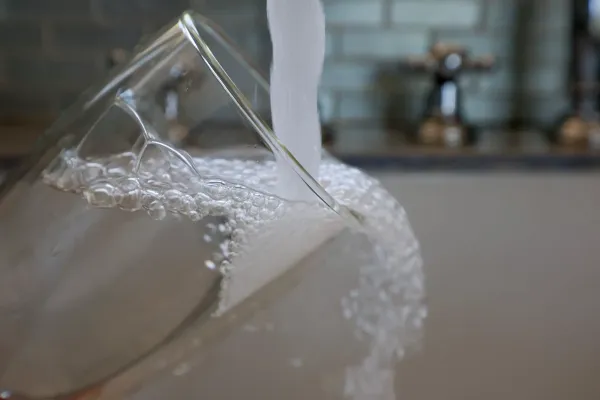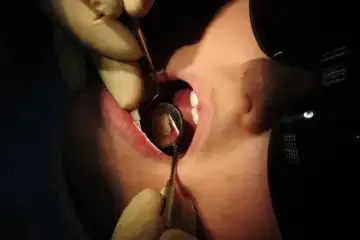Concerns over fluoride levels in drinking water as expert urges Britain to reassess dosage
admin | September 15, 2025 12:22 PM CST

Concerns have been raised that some babies in Britain may be having more fluoride than experts in Europe believe is safe as a leading supporter of fluoridated water urged officials to look again at the dosage.
Experts from the European Food Standard Agency (EFSA) in July set a maximum limit of 1milligram of fluoride a day for children under the age of one to consume after recent studies suggested too much exposure to the chemical may damage developing brains
One expert has now warned that babies living in areas of the UK where fluoride is added to the water could already be drinking the amount deemed unsafe by European experts.
Around 6 million people have fluoride added to water in Britain as a way of avoiding tooth decay. The UK level is currently set at a concentration of 1mg per litre but can go up to 1.5mg per litre under British law, a threshold currently accepted as safe by the World Health Organisation.
 Professor Vyvyan Howard, a toxico-pathologist specialising in the effects of harmful substances on the foetus and former member of a government advisory panel on pesticides, said: "I don't know a parent who would trade an iota of their child's intelligence for the offer that they might prevent a fraction of a filling."
Prof Howard said the average fluid intake of a 1-year-old in Britain is 1.1 to 1.2 litres per day and some will drink more. So if water has 1mg per litre of fluoride, the safety margin - according to the researchers in Europe - is zero. Those most likely affected are babies aged between six and twelve month who drink formula milk, he said.
His warning comes as Professor Fawell, an academic who is a WHO adviser and leading support of fluoride in drinking water, called for officials to look again at the dosage used in water in Britain.
Professor Fawell, who has written a book on the benefits of fluoridation for oral health, believes the UK should consider bringing its concentration in water in line with the United States and Canada at 0.7mg per litre, which is 30 per cent lower than the UK.
But the evidence pointing to a link between excessive fluoride levels and lowered IQ has been called in to question by other experts. The fluoridation of water has also been previously described in government documents as "the single most effective public health measure for reducing oral health inequalities and tooth decay rates".
The UK Food Standards Agency said officials were aware of research showing risks from exposure to fluoride, in particular on potential impacts on IQ, and said the Committee of Toxicology - an independent scientific committee that provides advice to the government - was reviewing the evidence. It is understood that the review could take up to two years.
A spokesperson said: "This research does not suggest these impacts on IQ are evident at the level of current UK regulatory limit for fluoride in drinking water, but a referral has been made to the Committee on Toxicology, so it is able to make an independent assessment of this evidence."
Professor Vyvyan Howard, a toxico-pathologist specialising in the effects of harmful substances on the foetus and former member of a government advisory panel on pesticides, said: "I don't know a parent who would trade an iota of their child's intelligence for the offer that they might prevent a fraction of a filling."
Prof Howard said the average fluid intake of a 1-year-old in Britain is 1.1 to 1.2 litres per day and some will drink more. So if water has 1mg per litre of fluoride, the safety margin - according to the researchers in Europe - is zero. Those most likely affected are babies aged between six and twelve month who drink formula milk, he said.
His warning comes as Professor Fawell, an academic who is a WHO adviser and leading support of fluoride in drinking water, called for officials to look again at the dosage used in water in Britain.
Professor Fawell, who has written a book on the benefits of fluoridation for oral health, believes the UK should consider bringing its concentration in water in line with the United States and Canada at 0.7mg per litre, which is 30 per cent lower than the UK.
But the evidence pointing to a link between excessive fluoride levels and lowered IQ has been called in to question by other experts. The fluoridation of water has also been previously described in government documents as "the single most effective public health measure for reducing oral health inequalities and tooth decay rates".
The UK Food Standards Agency said officials were aware of research showing risks from exposure to fluoride, in particular on potential impacts on IQ, and said the Committee of Toxicology - an independent scientific committee that provides advice to the government - was reviewing the evidence. It is understood that the review could take up to two years.
A spokesperson said: "This research does not suggest these impacts on IQ are evident at the level of current UK regulatory limit for fluoride in drinking water, but a referral has been made to the Committee on Toxicology, so it is able to make an independent assessment of this evidence."
 In Europe, only Ireland and 10 per cent of Spain have artificially fluoridated water. Sweden, Netherlands, Hungary and the Czech Republic have ended schemes in the past.
In contrast, the UK - which already adds fluoride to the water in areas such as the West Midlands, North West and North East - plans to increase fluoridation in the North East. The expansion will affect an additional 1.6 million people in areas like Darlington, Durham, Newcastle, Sunderland and Middlesbrough.
The decision follows a public consultation and is part of a national strategy to improve dental health.
In August last year, a major study was published by the National Toxicology Program in the US which found "with moderate confidence, that higher estimated fluoride exposures are consistently associated with lower IQ in children".
It reported that, of 72 known scientific studies into brain damage globally over more than 30 years, 64 show fluoride affected the developing brain. This included 18 out of 19 studies considered high quality. A 2019 study by Rivka Green et al found a 3.66 decrease in IQ points in boys for every 1mg per litre increase in fluoride in maternal urine. In 2020, Christine Till et al found there was an 8.8 point reduction in IQ for babies fed formula milk made up with fluoridated water.
There have also been challenges in America over the levels of fluoride. A California court assessed the available evidence and ruled that at 0.7mg per litre of fluoride represents an "unreasonable risk to human health".
Judge Edward Chen demanded a response from the US Environmental Protection Agency. The EPA has appealed his ruling.
Although the California ruling did not conclude with certainty that fluoridation at 0.7mg/litre was harmful, the National Toxicology Programme in the US has stated that it has moderate confidence that fluoride is a neurotoxin for unborn children at 1.5mg per litre.
Prof Fawell said no specific mechanisms have been identified for fluoride having a neurocognitive effect and epidemiology cannot, at this moment, conclude that there is an association between fluoride exposure and IQ, although more studies are under way.
But he added: "I expect to be involved in a WHO re-evaluation of the guideline for fluoride in the guidelines for drinking water quality."
WHO recommends fluoridation to prevent tooth decay. It confirmed that the latest scientific research would be assessed for the 5th edition of its guidelines later this year.
Prof Howard, meanwhile, says the current research cannot be ignored, describing the US judgement as a "game stopper".
He also pointed to the recent Catfish studies which showed minimal benefit from adding fluoride to water in preventing tooth decay. This research, conducted by the Universities of Manchester, Aberdeen and Dundee, showed an advantage of only a "quarter of a tooth" not decayed, missing or filled on average.
In America, two states - Utah and Florida - have banned fluoride in drinking water. Five others have introduced fluoride bills.
But Dr Barry Cockcroft, former chief dental officer and chair of the British Fluoridation Society, said scientific studies suggesting harm to unborn children and babies have been flawed. He invited anti-fluoride campaigners to watch a small child having a tooth extracted as tooth decay is the primary reason 5-9-year-olds end up in hospital, according to data published by the NHS.He said that his children and grandchildren live in Warwickshire and he would not be promoting fluoride if there was the slightest risk to their IQ.
"In the UK, there are three-year reviews of the health impact of fluoride. If anything is identified, they check on it. They never find anything that's conclusive," he said.
He said that his view had now changed slightly regarding the need for universal fluoridation. Fluoride could be added to water in areas of higher deprivation like the North East rather than universally because that's where the greatest benefit to dental health would be achieved, he said. He also accepted more people are using fluoride toothpaste which reduces the need for adding fluoride to water.
The Department of Health and Social Care said: "The fluoride levels permitted in the UK are proven to be safe and are well below the levels quoted in Who safety guidelines (1.5mg/litre).
"There have been multiple reviews of water fluoridation schemes from around the world. The common finding of these reviews is that water fluoridation, at levels permitted in England, is safe and effective."
It added: "There is a duty to monitor effects of water fluoridation schemes on health. The next health monitoring report will be published in 2026."
In Europe, only Ireland and 10 per cent of Spain have artificially fluoridated water. Sweden, Netherlands, Hungary and the Czech Republic have ended schemes in the past.
In contrast, the UK - which already adds fluoride to the water in areas such as the West Midlands, North West and North East - plans to increase fluoridation in the North East. The expansion will affect an additional 1.6 million people in areas like Darlington, Durham, Newcastle, Sunderland and Middlesbrough.
The decision follows a public consultation and is part of a national strategy to improve dental health.
In August last year, a major study was published by the National Toxicology Program in the US which found "with moderate confidence, that higher estimated fluoride exposures are consistently associated with lower IQ in children".
It reported that, of 72 known scientific studies into brain damage globally over more than 30 years, 64 show fluoride affected the developing brain. This included 18 out of 19 studies considered high quality. A 2019 study by Rivka Green et al found a 3.66 decrease in IQ points in boys for every 1mg per litre increase in fluoride in maternal urine. In 2020, Christine Till et al found there was an 8.8 point reduction in IQ for babies fed formula milk made up with fluoridated water.
There have also been challenges in America over the levels of fluoride. A California court assessed the available evidence and ruled that at 0.7mg per litre of fluoride represents an "unreasonable risk to human health".
Judge Edward Chen demanded a response from the US Environmental Protection Agency. The EPA has appealed his ruling.
Although the California ruling did not conclude with certainty that fluoridation at 0.7mg/litre was harmful, the National Toxicology Programme in the US has stated that it has moderate confidence that fluoride is a neurotoxin for unborn children at 1.5mg per litre.
Prof Fawell said no specific mechanisms have been identified for fluoride having a neurocognitive effect and epidemiology cannot, at this moment, conclude that there is an association between fluoride exposure and IQ, although more studies are under way.
But he added: "I expect to be involved in a WHO re-evaluation of the guideline for fluoride in the guidelines for drinking water quality."
WHO recommends fluoridation to prevent tooth decay. It confirmed that the latest scientific research would be assessed for the 5th edition of its guidelines later this year.
Prof Howard, meanwhile, says the current research cannot be ignored, describing the US judgement as a "game stopper".
He also pointed to the recent Catfish studies which showed minimal benefit from adding fluoride to water in preventing tooth decay. This research, conducted by the Universities of Manchester, Aberdeen and Dundee, showed an advantage of only a "quarter of a tooth" not decayed, missing or filled on average.
In America, two states - Utah and Florida - have banned fluoride in drinking water. Five others have introduced fluoride bills.
But Dr Barry Cockcroft, former chief dental officer and chair of the British Fluoridation Society, said scientific studies suggesting harm to unborn children and babies have been flawed. He invited anti-fluoride campaigners to watch a small child having a tooth extracted as tooth decay is the primary reason 5-9-year-olds end up in hospital, according to data published by the NHS.He said that his children and grandchildren live in Warwickshire and he would not be promoting fluoride if there was the slightest risk to their IQ.
"In the UK, there are three-year reviews of the health impact of fluoride. If anything is identified, they check on it. They never find anything that's conclusive," he said.
He said that his view had now changed slightly regarding the need for universal fluoridation. Fluoride could be added to water in areas of higher deprivation like the North East rather than universally because that's where the greatest benefit to dental health would be achieved, he said. He also accepted more people are using fluoride toothpaste which reduces the need for adding fluoride to water.
The Department of Health and Social Care said: "The fluoride levels permitted in the UK are proven to be safe and are well below the levels quoted in Who safety guidelines (1.5mg/litre).
"There have been multiple reviews of water fluoridation schemes from around the world. The common finding of these reviews is that water fluoridation, at levels permitted in England, is safe and effective."
It added: "There is a duty to monitor effects of water fluoridation schemes on health. The next health monitoring report will be published in 2026."
 Professor Vyvyan Howard, a toxico-pathologist specialising in the effects of harmful substances on the foetus and former member of a government advisory panel on pesticides, said: "I don't know a parent who would trade an iota of their child's intelligence for the offer that they might prevent a fraction of a filling."
Prof Howard said the average fluid intake of a 1-year-old in Britain is 1.1 to 1.2 litres per day and some will drink more. So if water has 1mg per litre of fluoride, the safety margin - according to the researchers in Europe - is zero. Those most likely affected are babies aged between six and twelve month who drink formula milk, he said.
His warning comes as Professor Fawell, an academic who is a WHO adviser and leading support of fluoride in drinking water, called for officials to look again at the dosage used in water in Britain.
Professor Fawell, who has written a book on the benefits of fluoridation for oral health, believes the UK should consider bringing its concentration in water in line with the United States and Canada at 0.7mg per litre, which is 30 per cent lower than the UK.
But the evidence pointing to a link between excessive fluoride levels and lowered IQ has been called in to question by other experts. The fluoridation of water has also been previously described in government documents as "the single most effective public health measure for reducing oral health inequalities and tooth decay rates".
The UK Food Standards Agency said officials were aware of research showing risks from exposure to fluoride, in particular on potential impacts on IQ, and said the Committee of Toxicology - an independent scientific committee that provides advice to the government - was reviewing the evidence. It is understood that the review could take up to two years.
A spokesperson said: "This research does not suggest these impacts on IQ are evident at the level of current UK regulatory limit for fluoride in drinking water, but a referral has been made to the Committee on Toxicology, so it is able to make an independent assessment of this evidence."
Professor Vyvyan Howard, a toxico-pathologist specialising in the effects of harmful substances on the foetus and former member of a government advisory panel on pesticides, said: "I don't know a parent who would trade an iota of their child's intelligence for the offer that they might prevent a fraction of a filling."
Prof Howard said the average fluid intake of a 1-year-old in Britain is 1.1 to 1.2 litres per day and some will drink more. So if water has 1mg per litre of fluoride, the safety margin - according to the researchers in Europe - is zero. Those most likely affected are babies aged between six and twelve month who drink formula milk, he said.
His warning comes as Professor Fawell, an academic who is a WHO adviser and leading support of fluoride in drinking water, called for officials to look again at the dosage used in water in Britain.
Professor Fawell, who has written a book on the benefits of fluoridation for oral health, believes the UK should consider bringing its concentration in water in line with the United States and Canada at 0.7mg per litre, which is 30 per cent lower than the UK.
But the evidence pointing to a link between excessive fluoride levels and lowered IQ has been called in to question by other experts. The fluoridation of water has also been previously described in government documents as "the single most effective public health measure for reducing oral health inequalities and tooth decay rates".
The UK Food Standards Agency said officials were aware of research showing risks from exposure to fluoride, in particular on potential impacts on IQ, and said the Committee of Toxicology - an independent scientific committee that provides advice to the government - was reviewing the evidence. It is understood that the review could take up to two years.
A spokesperson said: "This research does not suggest these impacts on IQ are evident at the level of current UK regulatory limit for fluoride in drinking water, but a referral has been made to the Committee on Toxicology, so it is able to make an independent assessment of this evidence."
 In Europe, only Ireland and 10 per cent of Spain have artificially fluoridated water. Sweden, Netherlands, Hungary and the Czech Republic have ended schemes in the past.
In contrast, the UK - which already adds fluoride to the water in areas such as the West Midlands, North West and North East - plans to increase fluoridation in the North East. The expansion will affect an additional 1.6 million people in areas like Darlington, Durham, Newcastle, Sunderland and Middlesbrough.
The decision follows a public consultation and is part of a national strategy to improve dental health.
In August last year, a major study was published by the National Toxicology Program in the US which found "with moderate confidence, that higher estimated fluoride exposures are consistently associated with lower IQ in children".
It reported that, of 72 known scientific studies into brain damage globally over more than 30 years, 64 show fluoride affected the developing brain. This included 18 out of 19 studies considered high quality. A 2019 study by Rivka Green et al found a 3.66 decrease in IQ points in boys for every 1mg per litre increase in fluoride in maternal urine. In 2020, Christine Till et al found there was an 8.8 point reduction in IQ for babies fed formula milk made up with fluoridated water.
There have also been challenges in America over the levels of fluoride. A California court assessed the available evidence and ruled that at 0.7mg per litre of fluoride represents an "unreasonable risk to human health".
Judge Edward Chen demanded a response from the US Environmental Protection Agency. The EPA has appealed his ruling.
Although the California ruling did not conclude with certainty that fluoridation at 0.7mg/litre was harmful, the National Toxicology Programme in the US has stated that it has moderate confidence that fluoride is a neurotoxin for unborn children at 1.5mg per litre.
Prof Fawell said no specific mechanisms have been identified for fluoride having a neurocognitive effect and epidemiology cannot, at this moment, conclude that there is an association between fluoride exposure and IQ, although more studies are under way.
But he added: "I expect to be involved in a WHO re-evaluation of the guideline for fluoride in the guidelines for drinking water quality."
WHO recommends fluoridation to prevent tooth decay. It confirmed that the latest scientific research would be assessed for the 5th edition of its guidelines later this year.
Prof Howard, meanwhile, says the current research cannot be ignored, describing the US judgement as a "game stopper".
He also pointed to the recent Catfish studies which showed minimal benefit from adding fluoride to water in preventing tooth decay. This research, conducted by the Universities of Manchester, Aberdeen and Dundee, showed an advantage of only a "quarter of a tooth" not decayed, missing or filled on average.
In America, two states - Utah and Florida - have banned fluoride in drinking water. Five others have introduced fluoride bills.
But Dr Barry Cockcroft, former chief dental officer and chair of the British Fluoridation Society, said scientific studies suggesting harm to unborn children and babies have been flawed. He invited anti-fluoride campaigners to watch a small child having a tooth extracted as tooth decay is the primary reason 5-9-year-olds end up in hospital, according to data published by the NHS.He said that his children and grandchildren live in Warwickshire and he would not be promoting fluoride if there was the slightest risk to their IQ.
"In the UK, there are three-year reviews of the health impact of fluoride. If anything is identified, they check on it. They never find anything that's conclusive," he said.
He said that his view had now changed slightly regarding the need for universal fluoridation. Fluoride could be added to water in areas of higher deprivation like the North East rather than universally because that's where the greatest benefit to dental health would be achieved, he said. He also accepted more people are using fluoride toothpaste which reduces the need for adding fluoride to water.
The Department of Health and Social Care said: "The fluoride levels permitted in the UK are proven to be safe and are well below the levels quoted in Who safety guidelines (1.5mg/litre).
"There have been multiple reviews of water fluoridation schemes from around the world. The common finding of these reviews is that water fluoridation, at levels permitted in England, is safe and effective."
It added: "There is a duty to monitor effects of water fluoridation schemes on health. The next health monitoring report will be published in 2026."
In Europe, only Ireland and 10 per cent of Spain have artificially fluoridated water. Sweden, Netherlands, Hungary and the Czech Republic have ended schemes in the past.
In contrast, the UK - which already adds fluoride to the water in areas such as the West Midlands, North West and North East - plans to increase fluoridation in the North East. The expansion will affect an additional 1.6 million people in areas like Darlington, Durham, Newcastle, Sunderland and Middlesbrough.
The decision follows a public consultation and is part of a national strategy to improve dental health.
In August last year, a major study was published by the National Toxicology Program in the US which found "with moderate confidence, that higher estimated fluoride exposures are consistently associated with lower IQ in children".
It reported that, of 72 known scientific studies into brain damage globally over more than 30 years, 64 show fluoride affected the developing brain. This included 18 out of 19 studies considered high quality. A 2019 study by Rivka Green et al found a 3.66 decrease in IQ points in boys for every 1mg per litre increase in fluoride in maternal urine. In 2020, Christine Till et al found there was an 8.8 point reduction in IQ for babies fed formula milk made up with fluoridated water.
There have also been challenges in America over the levels of fluoride. A California court assessed the available evidence and ruled that at 0.7mg per litre of fluoride represents an "unreasonable risk to human health".
Judge Edward Chen demanded a response from the US Environmental Protection Agency. The EPA has appealed his ruling.
Although the California ruling did not conclude with certainty that fluoridation at 0.7mg/litre was harmful, the National Toxicology Programme in the US has stated that it has moderate confidence that fluoride is a neurotoxin for unborn children at 1.5mg per litre.
Prof Fawell said no specific mechanisms have been identified for fluoride having a neurocognitive effect and epidemiology cannot, at this moment, conclude that there is an association between fluoride exposure and IQ, although more studies are under way.
But he added: "I expect to be involved in a WHO re-evaluation of the guideline for fluoride in the guidelines for drinking water quality."
WHO recommends fluoridation to prevent tooth decay. It confirmed that the latest scientific research would be assessed for the 5th edition of its guidelines later this year.
Prof Howard, meanwhile, says the current research cannot be ignored, describing the US judgement as a "game stopper".
He also pointed to the recent Catfish studies which showed minimal benefit from adding fluoride to water in preventing tooth decay. This research, conducted by the Universities of Manchester, Aberdeen and Dundee, showed an advantage of only a "quarter of a tooth" not decayed, missing or filled on average.
In America, two states - Utah and Florida - have banned fluoride in drinking water. Five others have introduced fluoride bills.
But Dr Barry Cockcroft, former chief dental officer and chair of the British Fluoridation Society, said scientific studies suggesting harm to unborn children and babies have been flawed. He invited anti-fluoride campaigners to watch a small child having a tooth extracted as tooth decay is the primary reason 5-9-year-olds end up in hospital, according to data published by the NHS.He said that his children and grandchildren live in Warwickshire and he would not be promoting fluoride if there was the slightest risk to their IQ.
"In the UK, there are three-year reviews of the health impact of fluoride. If anything is identified, they check on it. They never find anything that's conclusive," he said.
He said that his view had now changed slightly regarding the need for universal fluoridation. Fluoride could be added to water in areas of higher deprivation like the North East rather than universally because that's where the greatest benefit to dental health would be achieved, he said. He also accepted more people are using fluoride toothpaste which reduces the need for adding fluoride to water.
The Department of Health and Social Care said: "The fluoride levels permitted in the UK are proven to be safe and are well below the levels quoted in Who safety guidelines (1.5mg/litre).
"There have been multiple reviews of water fluoridation schemes from around the world. The common finding of these reviews is that water fluoridation, at levels permitted in England, is safe and effective."
It added: "There is a duty to monitor effects of water fluoridation schemes on health. The next health monitoring report will be published in 2026."
READ NEXT
-
Tamil film director Pa Ranjith accuses censor board of right-wing bias

-
Rise and Fall: Sangeeta Phogat breaks down into tears after learning about her father-in-law's demise; leaves the show mid-way

-
Ileana Opens Up About Postpartum Struggles After Second Child; 'It Was Different'

-
EMMYS 2025: Pedro Pascal looks dapper in all-white suit

-
Bigg Boss 19: Akshay Kumar roasts Pranit More over his jokes about Salman Khan and him; says 'We are waiting outside the Filmcity studio'
